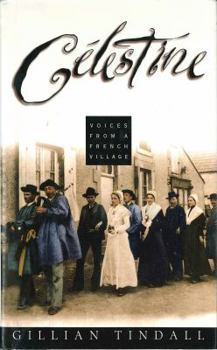Celestine: Voices from a French Village
Select Format
Select Condition 
Book Overview
In an abandoned old house in rural France, novelist Gillian Tindall discovered a cache of letters written in the 1860s, addressed to Celestine Chaumette. Tindall searched dusty archives and farmhouse attics and probed the memories and lore of local villagers in her quest for learn about Celestine. The treasures Tindall unearthed ultimately reach far beyond the mystery of one woman to tell of a vanished way of life, of a century of revolutionary change,...
Format:Hardcover
Language:English
ISBN:0805045465
ISBN13:9780805045468
Release Date:January 1996
Publisher:Henry Holt & Company
Length:292 Pages
Weight:0.95 lbs.
Dimensions:1.0" x 5.8" x 8.6"
Customer Reviews
5 ratings
Celestine: Voices From a French Village
Published by Thriftbooks.com User , 17 years ago
Fabulous book. If you want to understand the French, this is a great book to read. It is amazing that such a cultural country took so long to come into the 20th century. I recommend this book highly.
Rural France in the 19th century - a surprisingly primitive place develops.
Published by Thriftbooks.com User , 18 years ago
I took this remarkable book by Gillian Tindall on vacation and enjoyed it very much. It is quite an impressive bit of social history scholarship. Tindall has really raked the public records to reconstruct this history. I had a bit of trouble keeping the villagers straight as time passed and new villagers arrived and departed the scene. But that does not matter; I grasped the overall picture. Even Celestine, whose letters first interested the author in the project, becomes but another character and the real subject of the book emerges as the evolution of rural France in the 19th century. It is really quite a fantastic story, and, of course, I was wholly ignorant of the backward conditions in the Berry region until well into the 19th century. I always thought of France as in the forefront of the industrial revolution, the enlightenment and the political changes in Europe. But I now know that that was pretty well limited to Paris and perhaps a few other urban centers. The book makes clear that lack of transportation was the chief culprit. People did not have horses and the paths were largely for walking and did not accommodate wagons. And the distances were vast given the conditions. The villages had no stores, no inns, no tradesmen. Goods were mainly consumed by the farmers themselves with only a small surplus available in good years for sale locally. Money was not in use and French was not used until the 3rd Republic pushed schools and roads into these rural areas. Essentially, as the author points out, notwithstanding the revolution and the Napoleonic period, the Berry in 1830 was much like it had been in 1430. The author also hints at the romantic myth that the French have bestowed on their rural areas. She does not go into detail, but hints that this view results in their inability to lessen subsidies to their farmers or modernize their agriculture. All these Frenchmen, especially those in the middle class, with summer homes in the countryside, are apparently convinced that way back their ancestors were peasant farmers with a deep love of the land. The English and we Americans certainly do not encourage this illusion: that we are the salt of the earth - or at least the descendants thereof. We have our own myths, but our agricultural subsidies are based on the fact that farm states have more representation in the Senate than their population would justify and the strength of the agribusiness lobby. In other words, no romantic notions, just good old greed and political power. This is easier to deal with.
Exquisite micro history...not 'for women only'
Published by Thriftbooks.com User , 18 years ago
As a frequent vacationer in France, some customs -- especially in the countryside -- bewildered me. Ms. Tindall weaves details of country life into an exquisite tapestry (tapisserie) that explains much that was confusing. She moves her readers back in time and gently brings us to the present.
hauntingly beautiful
Published by Thriftbooks.com User , 24 years ago
I had in mind to get 'Celestine' for a long time when it presented itself to me on a 'bargain table' at the LA Times Festival of Books... what a treasure! It is a quiet and gentle diversion into another world and time. Beautifully and lovingly written by Gillian Tindall, the book speaks of the timelessness of the human condition, of loyalties and relationships, of loves and passions and hopes and dreams, some realized and some not. Truly, the more things change, the more they stay the same. I highly recommend this book.
A magnificent book
Published by Thriftbooks.com User , 26 years ago
Gillian Tindall shows a great deal of erudition in painting with great exactitude the evolution of a French village over almost two centuries, showing how the life of the village and its people were affected by the arrival of the railroads, the changes of political regimes, the influences of the wars. She has been able to capture the spirit of the french peasants of the Berry with a deep understanding and she gives the impression of feeling much affection for them. Her book is warm and " vivant " and wonderful





